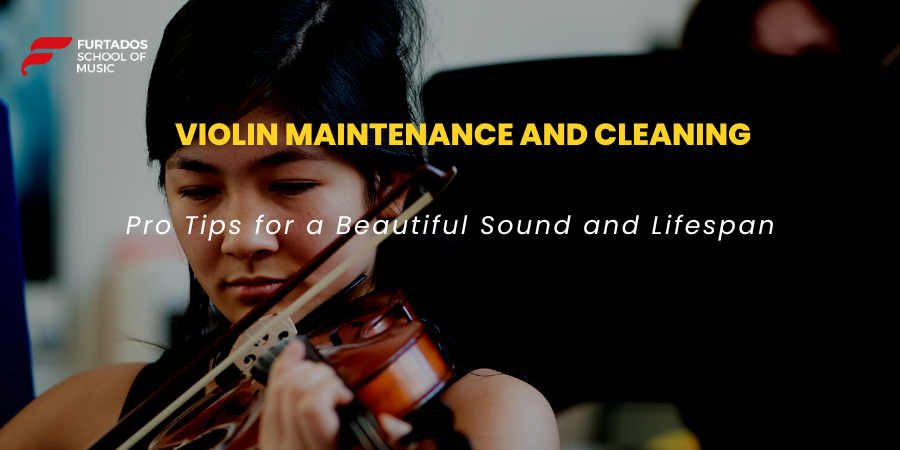As a dedicated violinist attending Furtados School of Music, you understand the unparalleled beauty and soul-stirring melodies that emanate from your violin. The violin is not just an instrument; it’s a vessel for artistic expression and emotional storytelling. To ensure that your violin continues to produce a beautiful sound and serves you for years to come, proper maintenance and cleaning are essential. In this comprehensive guide, we will share pro tips for violin maintenance and cleaning, helping you preserve the beauty and longevity of your beloved instrument.
- Store Your Violin in a Proper Case
Proper storage is crucial for protecting your violin from environmental factors and physical damage. When not playing your violin, store it in a high-quality violin case. The case should have a plush interior that provides adequate cushioning and support for your violin. It should also offer protection from dust, humidity, and temperature fluctuations. Avoid exposing your violin to direct sunlight or extreme temperatures, as these can damage the wood and affect the instrument’s structural integrity.
- Rosin Your Bow Regularly
Rosin is a vital component for producing sound on the violin strings. Apply rosin to your bow regularly to maintain optimal friction between the bow and the strings, ensuring a clear and resonant sound. Before rosining, make sure the bow hair is clean and free from any rosin buildup. Too much rosin can create a harsh sound, so apply it in moderation, depending on your playing style and the condition of the bow hair.
- Clean Your Violin After Each Playing Session
Regular cleaning is essential to maintain the appearance and sound quality of your violin. After each playing session, use a soft, lint-free cloth to gently wipe down the violin’s body, strings, and fingerboard. This removes rosin buildup, sweat, and dirt, preventing damage and maintaining the instrument’s luster. Avoid using any cleaning agents or chemicals on your violin, as they may harm the varnish or wood.
- Avoid Excessive Moisture and Extreme Temperatures
The violin is a delicate instrument made of wood, and excessive moisture or extreme temperatures can cause the wood to expand or contract, leading to structural issues. Store your violin in a controlled environment with stable humidity levels to ensure its integrity. Using a hygrometer, you can monitor the humidity levels around your violin and use a humidifier or dehumidifier to maintain the ideal humidity (around 40-60%).
- Loosen the Bow When Not in Use
When you’re done playing, remember to loosen the bow hair slightly to relieve tension on the bow. The bow hair can stretch and lose its springiness over time if it remains tight constantly. Loosening the bow also helps to preserve the camber (the natural curve) of the bow stick, which is essential for optimal playability.
- Schedule Regular Violin Maintenance
Regular maintenance by a qualified violin technician is essential for identifying and addressing any issues with your violin. While you can perform some basic maintenance yourself, such as cleaning and rosining the bow, professional maintenance ensures that your violin is in peak condition. A violin technician can check and adjust the bridge, soundpost, and nut, ensuring proper string height, intonation, and overall playability. They can also inspect for any open seams or cracks that may need attention.
- Change Violin Strings as Needed
Strings are a critical component of your violin’s sound. Over time, strings lose their brilliance and tonal quality due to playing and exposure to the environment. Change the strings regularly, depending on your playing frequency and style, to maintain a bright and resonant tone. New strings not only improve the sound but also make it easier to play and stay in tune.
- Handle Your Violin with Care
Treat your violin with gentle care. Avoid dropping or bumping it against hard surfaces, as even minor impacts can cause damage to the delicate wood and varnish. When carrying your violin, use a sturdy violin case or a violin backpack to protect it from accidental knocks. Always use a shoulder rest when playing, as it not only enhances comfort but also reduces pressure on the violin’s body.
Conclusion
By following these pro tips for violin maintenance and cleaning, you can ensure your cherished instrument continues to produce beautiful melodies and serves as your musical companion for years to come. At Furtados School of Music, we offer exceptional Violin Classes, including Online Violin Classes and Violin Classes near you. Our experienced instructors are passionate about nurturing your violin skills and providing the guidance and support you need to become a skilled violinist. Enroll in our classes today and embark on a melodious journey of artistic expression and emotional storytelling with your well-maintained violin.
